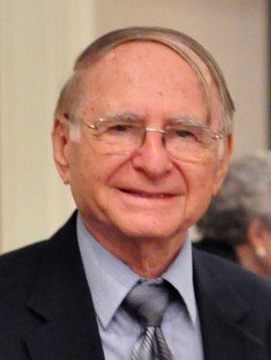Samuel Goetz, UCLA alumnus and Holocaust education advocate, dies at 85

By Janet Nguyen
Nov. 15, 2013 2:30 a.m.
Samuel Goetz, a UCLA alumnus and Holocaust survivor who paved the way for the creation of the first Holocaust studies chair at a public university in the United States, died on Oct. 24 of pancreatic cancer at his Los Angeles home. He was 85.
Goetz’s friends said he embodied a rare blend of tenacity and gentleness. After earning his bachelor’s degree from UCLA in 1955, he continued to devote his life to education in addition to working full-time as an optometrist.
Goetz fought passionately to further Holocaust studies and preserve the legacy of Holocaust survivors.
“He was never loath to confront the enormity of tragedy of the Holocaust, but he did so with decency, with a gentility and even with a kindness – a lack of vengeance that is really worthy of emulation,” said David Myers, chair of the history department and a close friend of Goetz.
When Goetz was 14, he was separated from his parents after Nazis removed them from his home in Tarnow, Poland, and brought them to a concentration camp, where they were killed.
After his parents were taken away, Goetz was sent to five concentration camps, where he performed forced labor, said Arnold Band, professor emeritus of Hebrew and comparative literature and a close friend of Goetz.
When World War II ended and concentration camp prisoners were liberated, some survivors found themselves facing another round of anti-Semitism,Myers said.
Goetz saw education as a tool to combat the surge of anti-Semitic propaganda in the ’70s and ’80s that claimed the Holocaust never happened, Myers said.
When Myers first came to UCLA, he said he would find pamphlets in his mailbox that contained arguments contesting the occurrence of the Holocaust.
“This was a period in which there was, in a certain sense, a battle to be waged,” Myers said.
Goetz, in an effort to combat Holocaust revisionism, devoted years trying to convince UCLA administrators that the field of Holocaust studies was important.
Goetz persuaded chancellors and deans at UCLA that Holocaust education at the university level could raise a generation of students who would teach others what they learned about the Holocaust, Myers said.
Eventually, UCLA established the Holocaust studies chair in 1979 and appointed Professor Saul Friedlander as the first permanent incumbent to the position in 1987. Friedlander’s duties include teaching undergraduate and graduate courses in Holocaust studies and inviting scholars to lecture.
“Without Sam, (the chair) would have never happened,” Friedlander said. “(Goetz) was a passionate man who really put a lot of his energy into developing this chair.”
Beyond UCLA, Goetz continued to try to teach others about the Holocaust by sharing his past with them.
In 1984, Goetz invited Band and his wife to come to Europe and visit the first concentration camp where he worked.
“I felt that was a very moving gesture. I’m not a Holocaust survivor. I’m an American kid brought up in Boston,” Band said. “But we were very close friends. He wanted us to be with him.”
Despite the gravity of the subject matter, Goetz remained unflappable, explaining clearly and calmly where he was and what had happened during his time there, Band said.
In the early ’80s, Goetz and Band both worked on a filming project in which the two videotaped interviews with Holocaust survivors in the basement of Powell Library. Goetz helped recruit survivors and encouraged them to share their experiences.
“He kept telling them that since they’re getting old, if they don’t put down their history on tape, it would be lost,” Band said.
Though Goetz was known for the creation of the Holocaust studies chair, some of his friends most fondly remember him for the way he performed seemingly everyday tasks, such as working at his optometry practice.
As one of Goetz’ patients, Myers said he enjoyed visits to his optometry practice where the two would discuss the latest research on the Holocaust while Goetz examined his eyes.
“We’d be dealing with very … difficult subjects,” said Myers. “And yet he would be treating me with extraordinary gentleness and kindness.”
Goetz remained an industrious presence at UCLA even after the establishment of the Holocaust studies chair.
Up until about two years ago, he would volunteer at the Jules Stein Eye Institute once a week and teach students about optometry, Band said.
A memorial service will be held on campus in collaboration with the history department, the UCLA Center for Jewish Studies, the Jules Stein Eye Institute and Hillel at UCLA most likely in early February, said Todd Presner, director of the Center for Jewish Studies.
Goetz is survived by his wife, Gertrude, their two children Joseph and Eugenia, as well as nine grandchildren.


